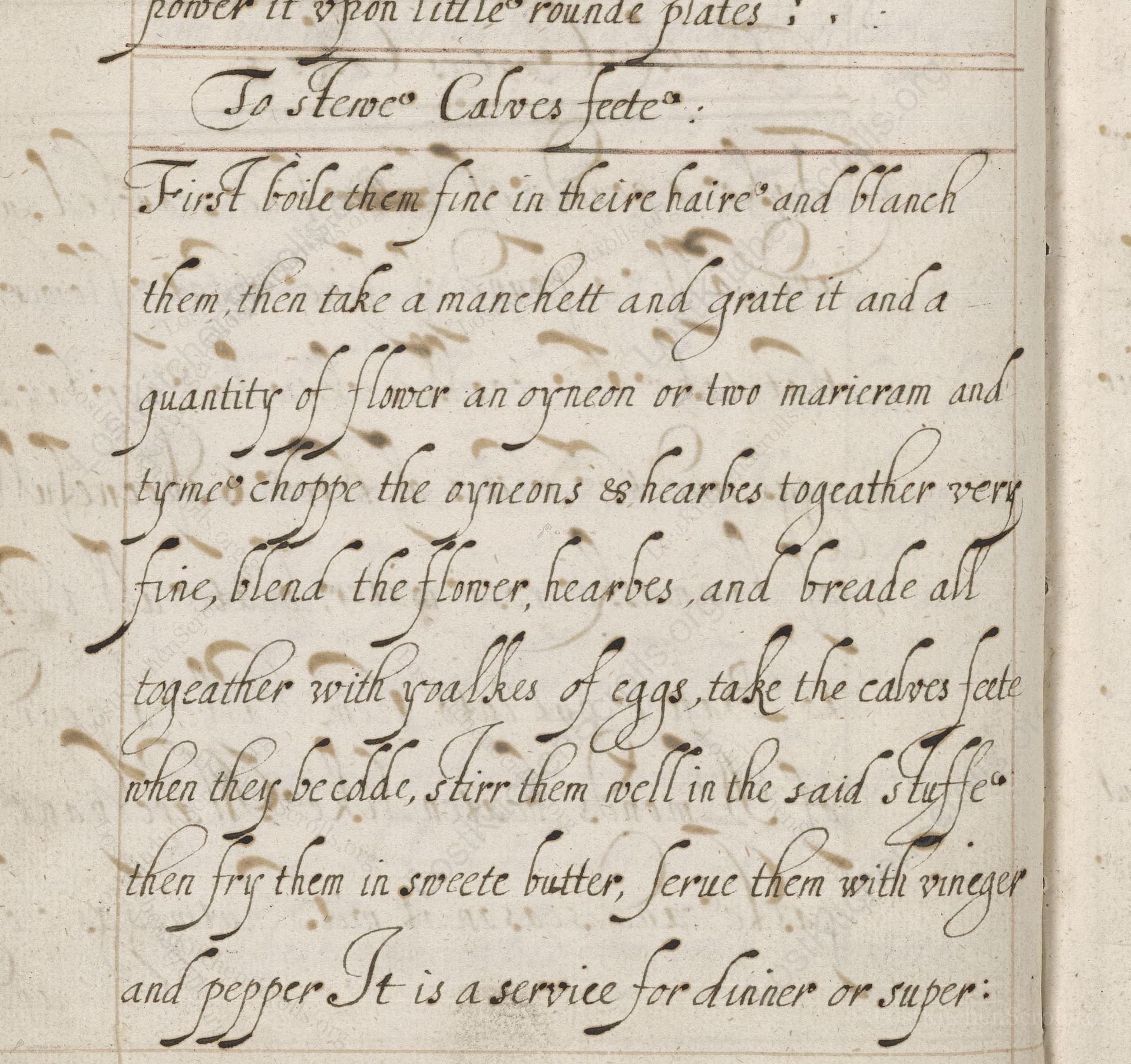To Stewe Calves Feete
From the treasured pages of Medicinal and cookery recipes by John King
Written by John King

To Stewe Calves Feete
"First boile them fine in theire haire and blanch them then take a manchett and grate it and a quantity of flower an oyneon or two maricram and tyme choppe the oyneons & hearbes togeather very fine, blend the flower, hearbes, and breade all togeather with yolkes of eggs, take the calves feete when they be colde, stirr them well in the said stuffe then fry them in sweete butterr, serve them with vineger and pepper It is a service for dinner or super:"
Note on the Original Text
The recipe's prose is typical of early modern English cookery, written in continuous sentences without explicit ingredient lists or measured quantities. Terms like 'manchett' (a fine white loaf), 'blanch' (to skin or whiten), and archaic spelling ('oyneon', 'maricram') are characteristic. Directions rely heavily on assumed kitchen knowledge—no times or temperatures specified, and tools are rarely mentioned. The writer expects the reader to know how to interpret phrases like 'stir them well in the said stuffe'—a charming glimpse into the confidence and domestic expertise of early 18th-century cooks!

Title
Medicinal and cookery recipes by John King (1675)
You can also click the book image above to peruse the original tome
Writer
John King
Era
1675
Publisher
Unknown
Background
A delightful journey into the kitchens of the 17th and early 18th centuries, this collection, attributed to John King, brims with time-honored recipes, culinary wisdom, and flavors that once graced historic tables.
Kindly made available by
Folger Shakespeare Library
This recipe comes from a manuscript collection likely compiled between 1625 and 1725, attributed to John King. This was an era of considerable culinary transition in England, marked by the increasing influence of French and continental styles, as well as greater refinement in household cookery. Dishes like stewed calves' feet were considered both nourishing and elegant—a suitable offering for either dinner or supper among the well-to-do. Manuscripts of this period often served as both practical family cookbooks and records of culinary fashion.

In the 17th and early 18th centuries, this dish would have been made over an open hearth or in a kitchen with a brick oven range. Boiling was done in large cast iron or copper pots, and frying would require a heavy pan or skillet, likely wrought iron. Chopping was done with large, well-sharpened knives, and grating bread employed wooden or metal graters. A wooden bowl and spoon would serve to mix the stuffing, with serving on pewter or ceramic platters.
Prep Time
30 mins
Cook Time
2 hrs 30 mins
Servings
4
We've done our best to adapt this historical recipe for modern kitchens, but some details may still need refinement. We warmly welcome feedback from fellow cooks and culinary historians — your insights support the entire community!
Ingredients
- 2 calves' feet (or substitute with pig's trotters if unavailable)
- 3.5 oz white bread, grated (or use breadcrumbs)
- 1.5 oz plain flour
- 1-2 medium onions
- Small bunch fresh marjoram (approx. 0.2 oz, or use 1 tsp dried)
- Small bunch fresh thyme (approx. 0.2 oz, or use 1 tsp dried)
- 3 egg yolks
- 1.75 oz unsalted butter
- 2 tbsp vinegar (white wine or cider vinegar)
- 1 tsp ground black pepper
Instructions
- Begin by thoroughly cleaning and boiling 2 calves' feet in water for about 2 hours, until tender.
- Once cooked, let them cool slightly, then remove any remaining skin and hair (or use already cleaned calves' feet, if available today).
- Next, grate about 3.5 oz of white bread (manchett, a fine white bread), and mix with 1.5 oz of plain flour.
- Chop 1-2 medium onions and a small bunch each of fresh marjoram and thyme, mixing these together finely.
- Combine the bread, flour, herbs, and onions, and bind them with 3 egg yolks to create a thick stuffing.
- Cut the calves' feet into manageable pieces, coat them thoroughly with the mixture, then fry in 1.75 oz of butter until golden brown.
- Serve hot, drizzled with vinegar and sprinkled with ground black pepper.
Estimated Calories
450 per serving
Cooking Estimates
It takes about 2 hours to cook the calves' feet, plus around 30 minutes to prepare the ingredients, make the stuffing, and finish the dish. Each serving has about 450 calories. This recipe makes 4 servings.
As noted above, we have made our best effort to translate and adapt this historical recipe for modern kitchens, taking into account ingredients nowadays, cooking techniques, measurements, and so on. However, historical recipes often contain assumptions that require interpretation.
We'd love for anyone to help improve these adaptations. Community contributions are highly welcome. If you have suggestions, corrections, or cooking tips based on your experience with this recipe, please share them below.
Join the Discussion
Rate This Recipe
Dietary Preference
Main Ingredients
Occasions

Den Bockfisch In Einer Fleisch Suppen Zu Kochen
This recipe hails from a German manuscript cookbook compiled in 1696, a time whe...

Die Grieß Nudlen Zumachen
This recipe comes from a rather mysterious manuscript cookbook, penned anonymous...

Ein Boudain
This recipe comes from an anonymous German-language manuscript cookbook from 169...

Ein Gesaltzen Citroni
This recipe, dating from 1696, comes from an extensive anonymous German cookbook...
Browse our complete collection of time-honored recipes



